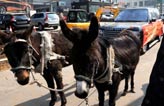OP Rana
Duplicity repeats itself in Libya
Updated: 2011-03-26 07:31
By OP Rana (China Daily)
What did you learn in school today / Dear little boy of mine? / I learned that war is not so bad / I learned of the great ones we have had / We fought in Germany and in France / And some day I might get my chance / That's what I learned in school today / That's what I learned in school.
The lines of Tom Paxton, immortalized by Pete Seeger's voice, sum up the tragedy being played out in Libya. Paxton was right, to hope warmongers will ever value peace is anything but wise.
History is awash with examples. Vietnam was thought to have taught the US a lesson or so it seemed before US-led forces attacked Afghanistan and Iraq. That is not to say the US had stopped interfering in other countries' internal affairs after Vietnam and before Afghanistan. That list is indeed long. What Afghanistan and Iraq (on a false pretext) did is give former US president George W. Bush the chance to mask his bloody wars as a "war on terror".
In Libya's case, though, not the US but France and Britain started beating the battle drums. In international relations of the powerful, might has always been right. And after the end of the Cold War, might and the US have become synonymous. It was this might that made Bush warn other countries: if you are not with "us", you are with "them". It's another matter that Bush's "us" comprised rich and powerful American individuals and corporations, not ordinary Americans.
Bush sure left behind an infectious legacy, which the French and British leaders have inherited with exemplary lan. Their bellicose statements before and during the attacks on Libya prove the infection has gone to their head. Perhaps the refusing-to-die impact of the global financial crisis has something to do with that.
Libyan leader Muammar Gadhafi certainly failed to diagnose the power of that infection, and helped the West's designs by using violence against his own people. Perhaps he learned the wrong lessons from Saddam Hussein. Even after Western coalition forces pounded his "defenses" on Wednesday, he was belligerent: "We will be victorious in the end". More of Saddam was evident in Gadhafi when he declared: "This assault ... is by a bunch of fascists who will end up in the dustbin of history."
Gadhafi may not be the best of leaders, and the Libyan rebels may have enough reasons to see his back. But all said and done the crisis in Libya, no matter how serious, is for the Libyan people to resolve. There's something called sovereignty and territorial integrity of a nation, and they demand respect.
The wave of protests that rose in Tunisia has swept across swathes of North Africa and the Middle East. The protests even led to regime change in Tunisia and Egypt. But people's power, not external intervention, brought about that change. External intervention is not the solution. Had it been, tens of thousands of innocent people would not have been killed and maimed in Iraq and Afghanistan.
It's true that the United Nations Security Council sanctioned the action in Libya. It's true that the Arab League and the African Union favored imposing a "no-fly zone" over Libya. But it's also true that bombing Libya was not what the Arab League and the African Union wanted or else, they wouldn't now be accusing the coalition of going beyond its UN mandate.
Besides, two of the five permanent Security Council members didn't support the resolution. China and Russia abstained from voting, so did Germany, Brazil and India. China and Russia have since called for an immediate ceasefire in Libya, expressing concern over civilian casualties. India has regretted the air strikes and expressed "grave concern at the violence and deteriorating humanitarian situation".
To make matters worse, the coalition, under NATO's command from March 24, has gone beyond the UN mandate and bombarded Gadhafi's residence. That brings US President Barack Obama into focus. The Pentagon says Gadhafi is not a target, but US missiles have struck his compound. Perhaps Obama wants to take out the Libyan leader. Didn't he say two weeks ago that Gadhafi "must leave"?
Sure, a US presidential executive order prevents any president from trying to assassinate foreign leaders. But the irony is that former US president Ronald Reagan, who passed that executive order in 1981, ordered the bombing of Gadhafi in 1986 - in the same compound hit last weekend - in response to an attack on US troops at a Berlin disco.
Double standard has been part of US leaders' policy. And however much different Obama presents himself to be he is no exception to the rule. He won the presidential election on the slogan of "change". But Libya is one more example of "more of the same" from the US president.
And the way the international media has been reporting on the Libyan tragedy - bombarding us with the success of the coalition forces and the Libyan rebels and the destruction of Gadhafi's forces, instead of questioning the very basis of Western military strikes - raises some valid fears. One of them is which country will be targeted after Libya. The attack seems to be a warming to national leaders who are hated by Western firms, and countries not yielding to Western interests, especially those with vast oil and other natural reserves.
The author is a senior editor with China Daily. E-mail: oprana@hotmail.com
E-paper

Rise and shine
The Chinese solar energy industry is heating up following recent setbacks in the nuclear sector
Preview of the coming issue
Bombs aim for regime change
CSI, with a twist
Specials

The queen of panda cubs
Spanish Queen Sofia laughs as she plays with a panda.

London's Olympic Stadium
Construction on the flagship stadium for the 2012 London Olympics was completed Tuesday.

Donkey-powered Land Rover
Two donkeys pull a broken-down Land Rover in Shenyang, Liaoning province.
